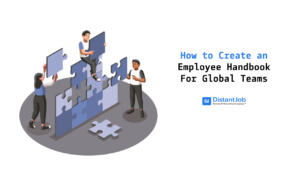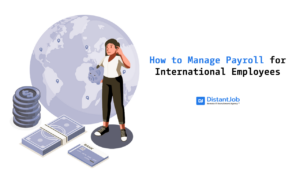‘I got a promotion.’
The four words employees want to say more than once in their lives. Getting a promotion means you are doing things right, and your career is progressing. All your efforts and stressful moments (even the ones where you wanted to break the computer into pieces) were all worth it. But we can’t ‘turn the blind eye’ to wonder if promotions and progressing in remote work is the same as in onsite companies. There is the thought that remote work will damage your career.
Promotions help to develop talent and allow employees to make their career grow. But what does it take to get employees promoted? An investigation researched sixty-four promotions that took place in three companies that belonged to the Fortune 500. Results showed that the three organizations looked into common factors when giving an employee a promotion—factors such as work ethic, interpersonal skills, intelligence, potential growth, and leadership. In the research, there is no information about if some of these employees where remote workers.
When you work from home, there is no ‘I’m going to pretend to be working while my boss is here.’ Remote employees don’t have physical offices where they have a boss that goes to check on them. They work at the time that works best for them; so, the only thing managers are expecting is results. Getting promoted and making your career jump to the next level in a distributed team is about getting the work done. Also, aspects like how independent employees are or how well they can communicate and interact with other team members are fundamental.
Studies prove that remote workers are happier, less stressed, and more productive. But some people are still skeptical about this subject and believe that going remote will do great harm to their careers.
How can your career grow the same way in a distributed team than in a non-distributed team?
There is not an exact answer to this question. It depends on the type of company you are telecommuting. A study made by Timothy D. Golden, a professor and area head of enterprise management and organization, in Lally School of Management at Rensselaer Polytechnic Institute, shares impressive results on this subject. The research shows that in terms of career growth, there is no difference. Remote workers and non-remote workers receive an equal number of promotions. But it does depend on one key factor: The importance that remote working is given in their workplace.
There is a big difference between being part of an all-remote company than to be in a company where you are the only remote worker. The previous study showed that remote workers had more probabilities of being promoted if they worked in companies were home-office was widely accepted. Those who worked in offices where few workers telecommute were less likely to receive a promotion.
Why?
This doesn’t mean that if you want to telecommute, you HAVE to work for a full-remote company. Or that if you’re going to hire a remote employee, you will think that person will feel bad and leave in a short period. It all depends on the company’s culture and how they value their employees, whether there are remote or not. You can have a thousand employees showing up in the office every day and only one remote worker 400,000 km away that feels as if he/she was working next to you if you implement the right communication channels and strategies.
If all companies encourage employees (remote and non-remote) to work harder for higher benefits, then what professor Golden concluded on his research would become a reality in all workplaces. Both types of workers would have the same privileges. It’s hard to think of someone that would put an extra effort if they knew their careers wouldn’t progress.

The problem with career progress isn’t remote working
It’s safe to say that the problem isn’t with telecommuting. Is on how companies and managers handle remote workers, whether they are all full-on board, a few, or about to hire the first remote worker. Your career can have exponential growth if you are working for a company that treats both types of employees equally.
There have always been false stereotypes of remote workers being fully isolated people that suffer from social anxiety (And of course, always drinking coffee). And many other myths that turn even to be funny about virtual teams, like for example, the conversation on the New Yorker about a remote worker talking to 911. It is because of these false myths that people think that remote working is not the best idea. There is this big fear that remote working won’t let your career progress.
Telecommuting is getting stronger with time. The main fear is the fear of the unknown. Yes, remote working indeed comes with learning to use new tools and developing skills that might make people feel overwhelmed. But, it’s much simpler than it seems; It’s just about finding the right people that fit into your company’s culture and developing an environment where everyone feels included.
Ever heard the saying, “You can’t mix apples and oranges”? The same happens with remote work. The study made by professor Golden insists that previous research treats all telecommuters as “one homogeneous group” when reality shows that every arrangement and contract made is different. The working environment and how a company deals with distributed employees are the critical factors that define how your career can grow while working from home. It’s not a black or white option; it depends on how telecommuting is seen in your workplace that will determine whether being part of that company is going to make your career take off or go backward.
Go for it!
We consider ourselves to be remote working ambassadors because we know by experience all the benefits. If you want to hire someone that exceeds your expectations, what are you waiting for? We can help you find your dream candidate. Contact us!



